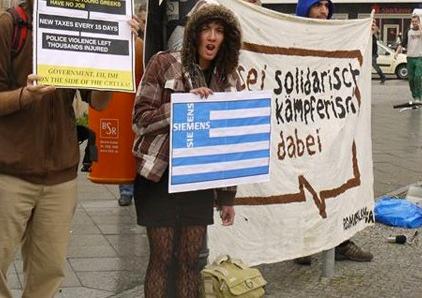Greeks in Germany caught up in economic turmoil
Photo of Berlin protest during Greek Prime Minister Papandreou’s visit. (Image by Caitlin Carroll)
Story by Caitln Carroll PRI’s The World. Listen to audio above for full report.
About a dozen Greek students stood in the rain, protesting outside a meeting of Greek and other European Union politicians in Berlin last week. They complained that the austerity measures that Greece imposed to meet creditor demands are too severe. Massive layoffs, salary cuts and spending freezes leave Greek residents with few options.
“It’s difficult,” said 27-year-old Valeria Mouzas, a recent university graduate from Thessaloniki, “because people outside Greece see the problem as a number, not as persons.”
The problem is that Greece is teetering on the brink of default, and it desperately needs a bailout from the other members of the 17-country eurozone. Last week, the German parliament approved an expanded EU rescue fund to help countries like Greece. But the German public is getting fed up with lending a helping hand. A recent poll suggested that more than 60 percent of Germans oppose the bailouts and think Greece should deal with its own debt.
Mouzas said she knows that Greece has to make some sacrifices, but she just wishes more could be done to stimulate the Greek economy. With unemployment running close to 40 percent among young Greek professionals, Mouzas plans to stay in Germany to find a job.
“I’m a bit stressed because maybe in some months I have to help my parents,” Mouzas said. “As my parents helped me now I have to help them.”
Another protester, Makis Tsamalikos, said his German friends tease him about his country’s financial straits. They offer to buy him a beer because Greeks have no money. It’s a joke, but Tsamalikos said it’s not that funny. He was home in Kavala, Greece a few weeks ago, “and I saw too many people looking in the garbage to find something useful.”
Tsamalikos said sometimes it’s hard living between two countries. When he’s in Germany, he hears that Greece should give back the money it borrowed. When he’s in Greece, people speak of Germany with suspicion.
“A lot of people in Greece talk about the Fourth Reich, the economic Reich. Some people in Greece believe is that we have a new occupation, this time a financial occupation of Greece,” Tsamalikos said.
Errikos Stamatakis, who works in Berlin as a deejay, decided to skip the protest because he doesn’t think it’ll change anything. He said these days, Germans think that Greeks are freeloaders. They don’t understand that Greeks work hard but still have low salaries and poor benefits.
“The German people think that the Greek people are lazy. But the truth is that the people in Greece work more than 10 or 12 hours a day.”
Read the rest of this story on The World website.
———————————————————-
PRI’s “The World” is a one-hour, weekday radio news magazine offering a mix of news, features, interviews, and music from around the globe. “The World” is a co-production of the BBC World Service, PRI and WGBH Boston. More about The World.
